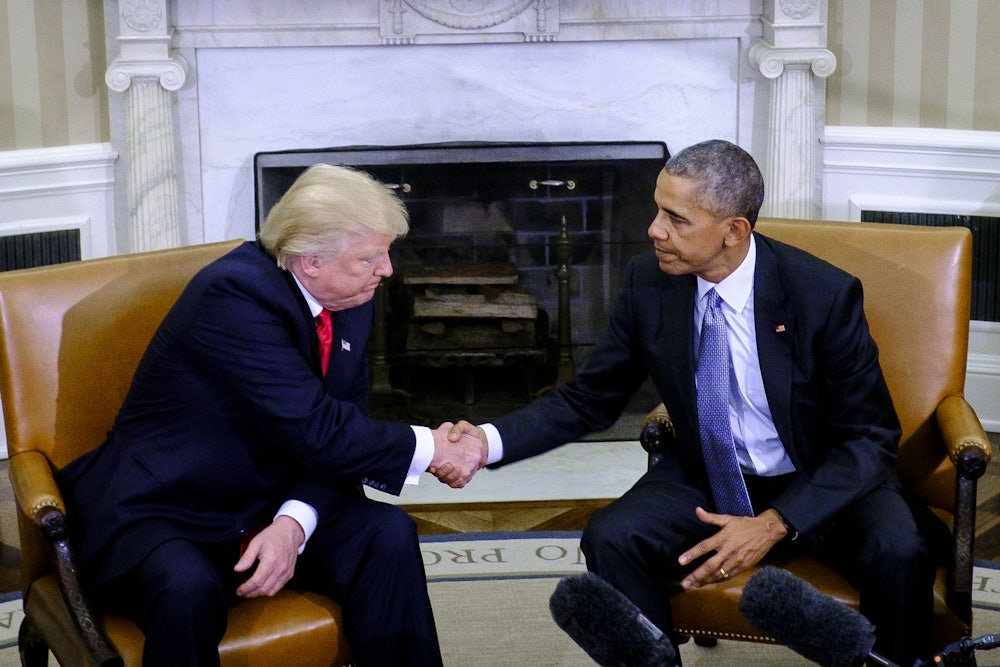Imagine a category-five hurricane was bearing down on the East Coast with a 30 percent chance of making landfall, but the evening news treated it as a remote threat. Then imagine the forecast changed to 100 percent. Then imagine the news sent a reporter and cameraman to the coast for a beachfront live shot, with the storm just over the horizon. Then imagine that they devoted their airtime to commenting on the beauty of the ocean and the talent of the surfers.
That is basically what has happened over the course of the past week, except that the hurricane is Donald Trump’s presidency, and the East Coast is all of us—America and the world.
On Wednesday, President Barack Obama delivered strikingly reassuring comments to the public from the White House’s Rose Garden about the coming transition to the Trump administration.
“We all want what’s best for this country,” Obama said. “That’s what I heard in Mr. Trump’s remarks last night. That’s what I heard when I spoke to him directly. And I was heartened by that. That’s what the country needs—a sense of unity; a sense of inclusion; a respect for our institutions, our way of life, rule of law; and a respect for each other. I hope that he maintains that spirit throughout this transition, and I certainly hope that’s how his presidency has a chance to begin.”
On Thursday, he welcomed Trump to the White House for a formal briefing and a photo-op, during which both men managed to appear friendly and productive.
President Obama says that if Trump succeeds, America succeeds, during White House meeting https://t.co/kDoELOHd18 https://t.co/5KsJqNGXlA
— CNN (@CNN) November 10, 2016
The political media has relished all of it: the pageantry, the symbolism, the implication that our system of government is sturdy enough to persevere through the ugliest election in modern history and withstand the transfer of control between two men who hate each other. The same press corps that was preparing itself two days earlier to cover Hillary Clinton’s emails for two more years swept Trump’s penchant for sexual assault and other depredations out of memory over night.
The New York Times described their meeting as an “extraordinary show of cordiality and respect between two men who have been political enemies and are stylistic opposites—Mr. Trump a brash real estate executive and reality television star whose campaign was defined in opposition to the sitting president, and Mr. Obama, a cool-tempered intellectual who has pressed a progressive agenda in office.”
Cable news network cameras were glued to the tarmac as Trump’s plane touched down in Washington.
“I think that is fascinating, but just to underline there,” said CNN’s John King, “Donald Trump saying during these comments he has respect for the president, he will seek council from the president when he is president of the United States.”
This all sounds very soothing, and Obama in particular must feel obligated to lead the transition with grace and dignity, irrespective of the horribly racist way that Trump—a leading proponent of birtherism—has treated him for the last several years.
But it is all extremely delusional—Obama’s sanguinity, the media’s wonderment, the supposition that antipathy between the outgoing president and the incoming one—as opposed to the latter’s governmental inexperience and contempt for preparation—would be the reason for a rocky transition. There may be fleeting upsides to lulling the public into a sense of calm, but at some point reality needs to break through all of the pomp.
The situation that confronts us is extremely dangerous, and not just for all the civic dissension Trump has inspired, or for his erratic, unpredictable nature. Apart from all the hiring Trump would have to do anyhow, his offensiveness and grotesque unfitness for office is likely to lead to an unusual number of civil-service departures. Relatedly, most decent, honorable professionals are not going to want to work for the Trump administration. At a nuts and bolts level, much of the federal government is going to be run by goons or not at all. This is on top of the fact that of all the basic things the president is required to do on a day-to-day basis—listen attentively, read closely, speak carefully—Trump lacks the intelligence and composure to do any of them.
This would be a combustible situation contained to itself, but in addition to the internal pandemonium, the Trump administration is likely to be tested, as new presidents often are, by hostile foreign actors. If and when that happens, Trump will be reliant on low-rent advisers and his own unstable temperament. This is to say nothing of his actual policymaking, which could include variants on mass expulsion, stop-and-frisk policing, and a de facto Muslim ban—all things his feral supporters continue to demand and expect.
On Wednesday, Washington Post media columnist Margaret Sullivan called on her own outlet and others to do better, and to stand up for their right to challenge Trump and his administration. The next day, members of the press did raise a fuss about the fact that Trump traveled to Washington for his meeting with Obama without his protective pool of reporters. But as I’ve argued in the past, the media lacks a vocabulary for guarding norms that aren’t centrally about press access and press freedom.
In addition to the banal chaos that the Trump administration is likely to unleash, we’re facing a moment that threatens equal protection, due process, free expression, democracy—not just press freedom. It’s not a drill. The media undersold the threat to many freedoms before election night, and it would be self-dealing, and a disservice, if the only liberty under attack we rose to defend was one that undergirds our industry.
There’s a fine line between whipping up panic and informing the citizenry so that people can respond in orderly, considered fashion. But this is an emergency and people need to be prepared for it—even if, in the end, the category-five hurricane is downgraded.
